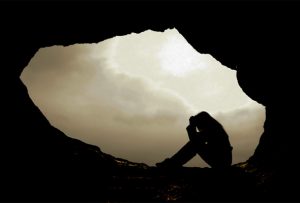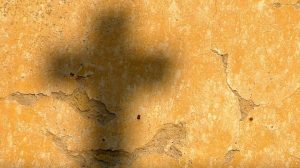The BEMA (βῆμα, בּימה ): The Bridge
I last wrote about the state of self-captivity (“self-tivity”) I call the Island. Having chased myself into the ground, following my own drive to make myself feel better about God, in the frustration, fatigue, inner fog, and fury, I cried out in anger and despair. At four in the morning, calm arrived and a peace with me and with God replaced the turmoil. The Bridge off the island had become both visible and available.
The Bridge is Jesus Christ.
I don’t have room for him until I am emptied out of myself. When, on the Island, the futility of me finally sinks in, when the fog of preoccupations, pettiness and passions becomes too thick for me to press on… I hear Him. Like Elijah slumped in his cave, I found it finally gets quiet inside. When I am really empty, He can find his home again in me. He can give himself in midnight silences, in sicknesses, in failure, in loss, in helplessness. When I am really empty, then, I can pray.

So I am back in my prayer garden. I really haven’t been there that much, lately. I have been out looking for the Bridge on my own and He has been waiting. Now, I can look out from my garden I see that I am actually some distance out on the Bridge, after all. I may even be on my way to the next island, which I have heard of, and perhaps even caught a glimpse of. But first I have to face some facts. The following observations may not apply to you, by the way. If your life is moving along well and is unfolding as you wish, it may be wise to skim through the next paragraph. This next is for the winter soldiers like me.
This earth, this island, is more like a hospital, than a garden or a factory nor even a lasting home. Any refuge I find on my own is temporary. My life is populated by many sick people, soul and otherwise, including me, and only a few are getting well. We do a fair bit of suffering, and if we do not suffer that much, we surely know people who do, and live in a world where it is the first thing most of us hear about every day. Most of us try to self-doctor, others are just in denial. So we suffer, no matter how we try escape. We take real damage. So we have scars, and we limp, and we get preoccupied with our hurts and coping … sometimes we cannot get out of the fog of our own pain on our own. So, often, we live negotiating with Misery.
If it weren’t for Jesus, this would be desperately bad news. All that religion, all that work, sacrifice, all that pain. And we still can’t get away from suffering. We just can’t get off the island ourselves, and living on it by ourselves, sooner or later, just looks and feels like — hell. By the way, I am talking about Christians here. I see it all around me, and, if you haven’t noticed, let me tell you flat out, I do it myself.
But, Jesus will go (in fact he has gone) to every length to deliver us from that. He plays a high-stakes game, you might say, on our behalf. He bears on his body forever the physical marks of death by torture, and of absolute abandonment both by and to His Father. Were he to stand before the Father, the glory of God would beam through the holes in his body towards us. Perhaps, as He intercedes, it looks that way. Whatever our suffering, we cannot out-suffer Him. If anyone knows what it is, and what God can do with it, it is Him. We should cling to the reality: He gets us. He really gets us. And His presence is real, even when we do not perceive it. In fact, trying to perceive it, trying really hard to perceive it, may indeed make it harder to realize.

Ever heard of “dark faith”? It’s the faith that we do not sing about much, nor even talk about much, though most of us have heard something of “the time of testing” or “the dark night of the soul”. We don’t talk about it much because no one wants to be negative, or lose friends or fellowship – it’s sort of a scandal we’d rather not deal with. It comes with a dark scandalous shadow called Doubt. It has no good feeling, or vibe. If we are not careful, and do not have good sound Christian mentors (and do go to them for wisdom and comfort, I really have had nothing but good experience with counsellors, including trained mental health professionals, including non-Christians), we might even think we somehow bring it on ourselves. Sometimes well-meaning (or otherwise) Christians even tell people that. Shun them, at least for a time, when the darkness comes. They do not know what they’re doing.
I say this because I have found that the times of dark faith, or dark trust, are when Jesus is doing surgery on my deepest sins, my most ingrained self. In times of dark faith, dying to self really feels like dying. But I also can testify to knowing, increasingly in those dark times, that I am surrounded by a kind of light. It is when I really give up on saving myself, or even when, to put it another way, all my self-care does not make me feel better, that I can perceive a Presence that is sympathetic and good. Then I know that my faith will be real faith, without any props. Then my hope is real hope. Can it be then that my real faith and real hope can be real love? John the Apostle wrote that whoever does the will of the Father is the lover of Jesus. Obedience before, maybe even without, or against, feelings, can be a great, a reassuringly great, discovery of our true identity. If I do not insist on owing myself, then I am really His.
If you know me, you also know that I do not do this very well. I want life to be fair. I expect everyone to do their best, and I am conceited enough to think I am doing just that already. I also want to have more control over things, or be able to take my problems to anyone who can fix them right away. I want my prayers answered, my income secure, my family prosperous, young, healthy and wise. When I can’t have all this at once, I whine, and in my worst moments, blame. And then Jesus shows me I am off wandering about the Island on my own again. The Bridge comes into the light, again. When I am empty, and receiving all He gives, then I have real Salvation. Thorough salvation. Because there is another Island, and I am supposed to be on the Bridge, a pilgrim to that place.
And it’s never too late to start all over again.
